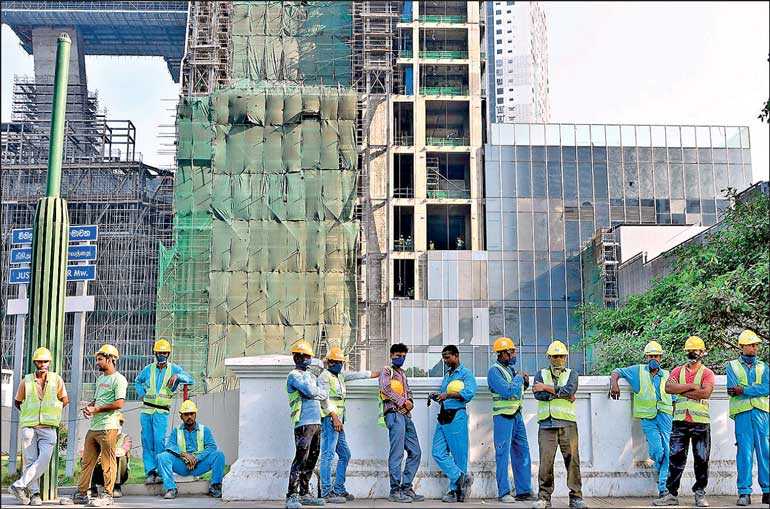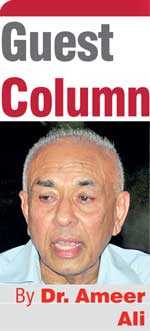Saturday Feb 07, 2026
Saturday Feb 07, 2026
Friday, 22 May 2020 00:00 - - {{hitsCtrl.values.hits}}

COVID-19 pandemic, after infecting nearly five million people globally, and killing more than 300,000 of them so far, does not seem to have receded. While efforts are being made by scientists to discover a  vaccine, the world is accepting the bitter truth that it has to live with that virus at least for a while longer. With that acceptance, countries are now counting the economic and social costs of COVID-19, and desperately looking for ways and means of recovering the losses to reach a ‘new normalcy’.
vaccine, the world is accepting the bitter truth that it has to live with that virus at least for a while longer. With that acceptance, countries are now counting the economic and social costs of COVID-19, and desperately looking for ways and means of recovering the losses to reach a ‘new normalcy’.
Economically, the damage is indeed colossal. The loss in terms of economic output, employment and income, and the magnitude of their total impact on people’s life and livelihood cannot be captured in simple numerical integers. IMF’s prediction of 3.2% drop in world economy does not tell us how many millions more if not billions of people would be pushed below the poverty line, how many millions of educated, skilled and able bodied individuals would join the army of unemployed, how many more would be homeless and how vast would be the size of the horde of economic refugees.
On top of all that are the social costs of domestic violence, mental stress and suicides. In short, the much touted New World Order (NWO) structured on the edifice of a globally integrated and technologically powered free market has collapsed and collapsed abysmally. It does not matter whether one calls it a recession or depression.
There were numerous warnings before from heterodox economists, social scientists and public intellectuals about the growing inequities and injustices inherent in NWO. Those who suffered directly from that order and those who sympathised with the sufferers demonstrated openly in several parts of the world, especially in cities where the managers of NWO’s New Economic Order (NEO) met for their periodic parleys. Even if those warnings and voices of protests were ignored as non-consequential and suppressed with bloodshed, at least the 2008 Global Financial Crisis (GFC) originated at the epicentre of NEO should have woken the guardians to realise that something was fundamentally wrong in that order.
Instead, it was business as usual. At a time when the entire economic paradigm demanded fundamental shift, establishment economists, central bankers, and money managers started tinkering at the edges of their models, hoping that the paradigm would remain resilient to shocks from unknown unknowns.
At last, thanks to coronavirus, a hitherto unknown unknown, economic managers and intellectual pundits are forced to go back to the drawing board to assess the damage and see whether NEO could be saved with few adjustments. One thing is certain. There is no quick recovery, and complete recovery is not possible within the existing NEO.
To start with, COVID-19 itself is a bi-product of the NWO that legitimises investment and research into nuclear, chemical, germ and biological warfare while ignoring its economic, social and environmental impact. Like the nuclear reactor accidents in Three Mile Island, USA in 1979, Chernobyl, Russia in 1986 and Fukushima Daiichi, Japan in 2011, germ warfare research also has misfired in Wuhan, China. Had China controlled the virus within its borders, it would have been business as usual. To China’s misfortune, and because of a globally integrated human society, the virus spread worldwide.
President Trump, who is accused of ignoring the early warnings of an impending disaster, and mishandled the infection once it entered his country stands accused by leaders from inside and outside his country. To deflect that accusation he has taken the opportunity to lead a vicious campaign against China. Instead of delegitimising risk-filled germ warfare research, in which several countries including the US are involved, trying to focus on punishing China, is going to cause more economic damage, as Australia is currently facing. This is not to excuse China for its diabolical mishap.
COVID-19, apart from exposing the dangers of germ warfare, has also revealed the imperilment of (a) making one nation the workshop of the world, (b) corporatising and financialising larger economies, and (c) leaving the fate of relatively smaller economies at the mercy of global market forces. It was Adam Smith, in his bible on capitalism, The Wealth of Nations, implanted the idea of comparative advantage in its crude form, which was later refined by David Ricardo.
“It is the maxim of every prudent master of a family”, Smith said, “never to attempt to make at home what it will cost him more to make than to buy …. What is prudence in the conduct of every private family can scarce be folly in that of a great kingdom …. If a foreign country can supply us with a commodity cheaper than we ourselves can make it, better buy it from them with some part of the produce of our own industry employed in a way in which we have some advantage”.
That principle of comparative advantage, advanced by Smith and Ricardo, to break down the walls of mercantilism and monopolies, and to open economies to competition and free trade, has, in course of time, metamorphosed into the principle of competitive advantage, as propounded by Michael Porter, to promote not only competition but even collusion among mega corporations.
NEO is the turf on which these corporations play their game. Pragmatic China joined the NEO after 1976, played the game, beat its competitors, and emerged as the winner by transforming China into the workshop of the world. China watchers know that when that country sneezes world catches cold. The corona-sneeze has now given pneumonia and struck a fatal blow to NEO itself.
Just as epidemiologists are in desperate search for a vaccine against COVID-19, so also should be economists and social scientists in search of a New Post-COVID-19 Economic Order (NPEO). What has happened economically and socially over the last few months is farm more damaging in scale than caused by the 1930 Depression or 2008 GFC. Recovery from the present disaster, especially for smaller economies, demands a lot more than conventional monetary adjustments, fiscal stimuli and digitalisation of economic activities.
Central Banks and national budgets alone are insufficient to turn the tide. It also needs institutional restructuring and an economic rationalism mellowed by ethical virtuosity. In that context, some old but discarded economic concepts and tools like, import substitution, reciprocal trade, small is beautiful, appropriate technology, co-operatives and so on, which were deemed costly and wasteful to operate under NEO may have to be re-considered and adapted. In short, pragmatism and not ideology and populism should be the driving force behind NPEO.
Above all, no nation will be able to recover completely and quickly unless its rulers carry with them the full cooperation of its people without impinging on their rights and democratic freedom.
(The writer is attached to the School of Business and Governance, Murdoch University, Western Australia.)